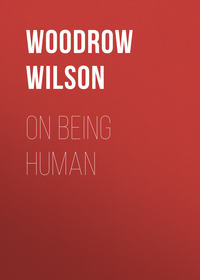Kitabı oku: «On Being Human», sayfa 4
IV
And then genuineness will bring serenity—which I take to be another mark of the right development of the true human being, certainly in an age passionate and confused as this in which we live. Of course serenity does not always go with genuineness. We must say of Dr. Johnson that he was genuine, and yet we know that the stormy tyrant of the Turk’s Head Tavern was not serene. Carlyle was genuine (though that is not quite the first adjective we should choose to describe him), but of serenity he allowed cooks and cocks and every modern and every ancient sham to deprive him. Serenity is a product, no doubt, of two very different things, namely, vision and digestion. Not the eye only, but the courses of the blood must be clear, if we would find serenity. Our word “serene” contains a picture. Its image is of the calm evening when the stars are out and the still night comes on; when the dew is on the grass and the wind does not stir; when the day’s work is over, and the evening meal, and thought falls clear in the quiet hour. It is the hour of reflection—and it is human to reflect. Who shall contrive to be human without this evening hour, which drives turmoil out, and gives the soul its seasons of self-recollection? Serenity is not a thing to beget inaction. It only checks excitement and uncalculating haste. It does not exclude ardor or the heat of battle: it keeps ardor from extravagance, prevents the battle from becoming a mere aimless melee. The great captains of the world have been men who were calm in the moment of crisis; who were calm, too, in the long planning which preceded crisis; who went into battle with a serenity infinitely ominous for those whom they attack. We instinctively associate serenity with the highest types of power among men, seeing in it the poise of knowledge and calm vision, the supreme heat and mastery which is without splutter or noise of any kind. The art of power in this sort is no doubt learned in hours of reflection, by those who are not born with it. What rebuke of aimless excitement there is to be got out of a little reflection, when we have been inveighing against the corruption and decadence of our own days, if only we have provided ourselves with a little knowledge of the past wherewith to balance our thought! As bad times as these, or any we shall see, have been reformed, but not by protests. They have been made glorious instead of shameful by the men who kept their heads and struck with sure self-possession in the fight. The world is very human, not a bit given to adopting virtues for the sakes of those who merely bemoan its vices, and we are most effective when we are most calmly in possession of our senses.
So far is serenity from being a thing of slackness or inaction that it seems bred, rather, by an equable energy, a satisfying activity. It may be found in the midst of that alert interest in affairs which is, it may be, the distinguishing trait of developed manhood. You distinguish man from the brute by his intelligent curiosity, his play of mind beyond the narrow field of instinct, his perception of cause and effect in matters to him indifferent, his appreciation of motive and calculation of results. He is interested in the world about him, and even in the great universe of which it forms a part, not merely as a thing he would use, satisfy his wants and grow great by, but as a field to stretch his mind in, for love of journeyings and excursions in the large realm of thought. Your full-bred human being loves a run afield with his understanding. With what images does he not surround himself and store his mind! With what fondness does he con travelers’ tales and credit poets’ fancies! With what patience does he follow science and pore upon old records, and with what eagerness does he ask the news of the day! No great part of what he learns immediately touches his own life or the course of his own affairs: he is not pursuing a business, but satisfying as he can an insatiable mind. No doubt the highest form of this noble curiosity is that which leads us, without self-interest, to look abroad upon all the field of man’s life at home and in society, seeking more excellent forms of government, more righteous ways of labor, more elevating forms of art, and which makes the greater among us statesmen, reformers, philanthropists, artists, critics, men of letters. It is certainly human to mind your neighbor’s business as well as your own. Gossips are only sociologists upon a mean and petty scale. The art of being human lifts to be a better level than that of gossip; it leaves mere chatter behind, as too reminiscent of a lower stage of existence, and is compassed by those whose outlook is wide enough to serve for guidance and a choosing of ways.
